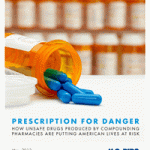
Prescription for Danger
How Prescription Drugs Produced by Compounding Pharmacies are Putting American Lives at Risk
Compounding pharmacies are increasingly behaving like pharmaceutical companies by producing drugs in bulk, despite the fact that they are not inspected or regulated like the pharmaceutical industry. Due to this lack of oversight, many compounding pharmacies have not adhered to safe manufacturing practices, and shown little regard for consumer safety. According to an analysis of warning letters sent to other compounding pharmacies by the FDA from 2002 to 2012, there is a long history of violations that have in many cases led to unnecessary illness, injury, and even death.
Downloads
U.S. PIRG

The fungal meningitis outbreak caused by contaminated steroid injections that killed 55 people to date and sickened more than 740 is one of the worst public health disasters the nation has seen in recent history. The tainted injections came from a drug manufacturer doing business as a “compounding pharmacy,” a classification which allowed them to evade the system of safety rules, inspections, and oversight that keep our drug supply safe. According to an analysis of warning letters sent to other compounding pharmacies by the FDA from 2002 to 2012, there is a long history of similar violations that have in many cases led to unnecessary illness, injury, and even death.
The letters clearly show that compounding pharmacies have been exploiting loopholes in the regulatory system for at least a decade. This public health crisis starkly highlights the difference in how compounding pharmacies are regulated compared to pharmaceutical companies, and the need for reform.
OUR KEY FINDINGS
Prescriptions are regularly compounded at pharmacies, after a doctor writes a prescription for a compounded drug. However, compounding pharmacies are increasingly behaving like pharmaceutical companies by producing drugs in bulk, despite the fact that they are not inspected or regulated like the pharmaceutical industry. Due to this lack of oversight, many compounding pharmacies have not adhered to safe manufacturing practices, and shown little regard for consumer safety. In the FDA warning letters, the most frequent violations cited included misbranding drugs; producing unapproved new drugs; producing drugs under unsanitary conditions; repackaging sterile drugs; and using unapproved, potentially unsafe ingredients. Some of the most egregious violations by compounding pharmacies included:
- In 2002, consumers complained about arthritis pain relief injections from Lee Pharmacy in Fort Smith, Arkansas. The FDA analyzed the injections and found they were all contaminated with pennicillium rugulosum, a fungus that can cause death.
- In 2009, Hopewell Pharmacy in Hopewell, New Jersey, was found to be using a solvent called diethylene glycol monoethyl ether in sterile injections used for the treatment of varicose veins. This ingredient is not approved by the FDA for use in drug manufacturing and is normally used in industrial cleaners.
- In 2005, University Pharmacy in Salt Lake City, Utah, was investigated because a 25-year-old woman lapsed into a coma and died from using Photocaine, a topical anesthetic cream produced by the pharmacy without the approval of the FDA.
RECOMMENDATIONS FOR POLICY MAKERS
The FDA must be given the power to regulate compounding pharmacies that produce drugs in high volume. These pharmacies are acting as pharmaceutical manufacturers and should play by the same rules as pharmaceutical companies. Consumers must be able to rely on the safety of their drugs, regardless of where they are produced.
RECOMMENDATIONS FOR CONSUMERS
Before any clinical or surgical treatment, talk to your doctor about the drugs that are going to be used and if they are compounded. If they are compounded drugs ask your doctor if an FDA-approved drug is available and appropriate for your treatment instead. If that is not possible ask where the compounded drug is made and check for safety alerts and warnings on the FDA website. If you experience any problems or adverse events with a medication, contact your doctor or pharmacist immediately. Report any adverse events experienced while using the product to the FDA’s MedWatch program.
Topics
Find Out More


PIRG joins open letter to Congress calling for “Same service, same price” policy

Hill Letter to US House: Vote “Yes” on Lower Costs, More Transparency

